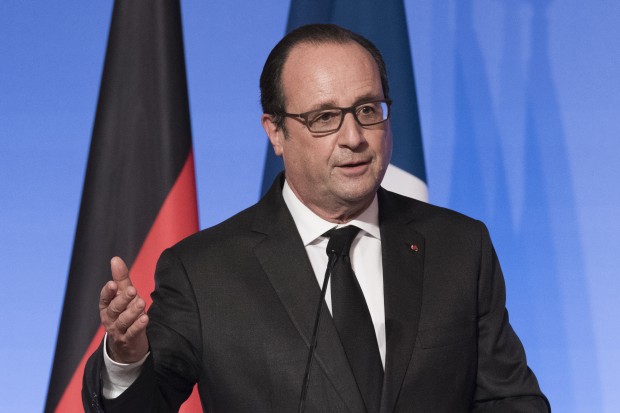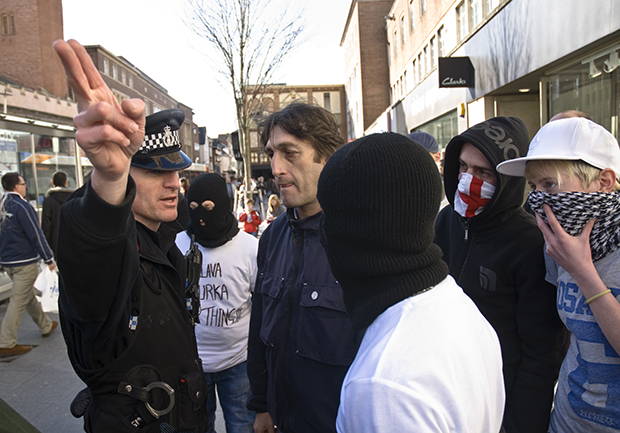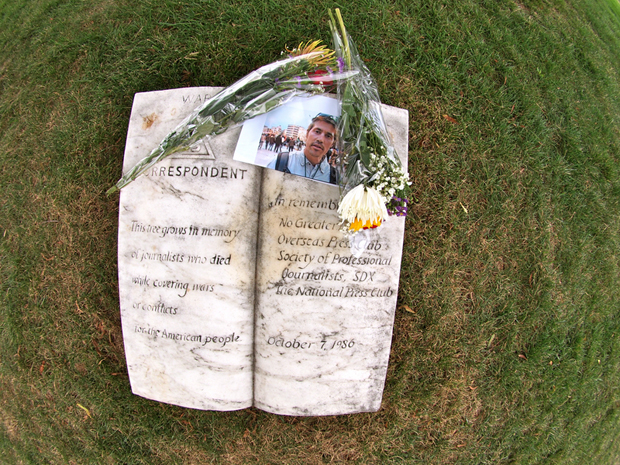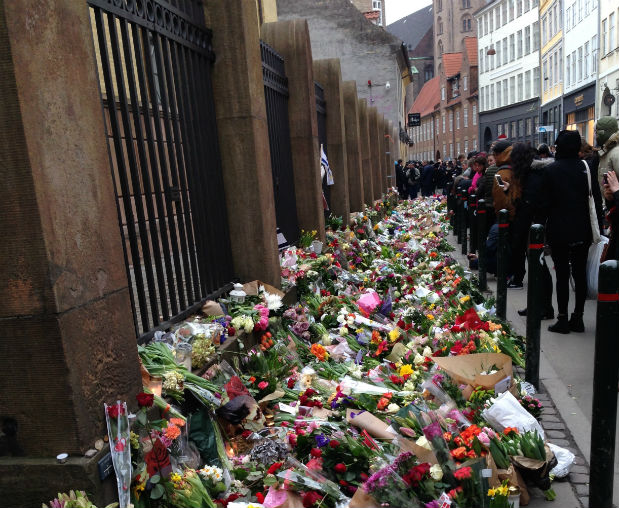27 Nov 2015 | Europe and Central Asia, France, Mapping Media Freedom, mobile, News

Editorial Credit: Frederic Legrand – COMEO / Shutterstock.com
Even before the attacks on Paris on 13 November were over, French President Francois Hollande declared a nationwide state of emergency giving authorities additional powers in the name of protecting citizens and combatting terrorism. But since the attacks, concerns have been raised for press freedom prompted by the cancellation of a regular radio segment by journalist Thomas Guénolé.
A few days after the events of 13 November, Guénolé devoted his daily morning commentary piece on RMC radio to what he perceived as the failings of the French security services and police. On the same day, the Interior Ministry called Philippe Antoine, RMC managing editor, to demand the radio station air a corrective to points Guénolé discussed during his segment, which the ministry would pen. “Interestingly, the corrective was not going to appear as a corrective emanating from the Interior Ministry but as the correction of an inaccurate information emanating from RMC,” Guénolé told me.
The proposed corrections were in relation to Guénolé’s discussion of claims reported by various news outlets, including that France had known since August 2015 that IS planned to attack a rock concert in France and that Turkish authorities had warned France twice this year about Omar Ismaïl Mostefaï, one of the assailants of the Bataclan massacre.
Guénolé called for a parliamentary investigation which should, if these claims were true, prompt the resignation of the highest ranking French officials, including Bernard Cazeneuve, France’s Minister of the Interior.
Guénolé also repeated information published by La Lettre A, which claimed only three out of 50 members of the Parisian Brigade de recherche et d’intervention (an anti-gang unit, which is to intervene in hostage situations) had been on duty after 8pm on the night of the attacks. On 19 November, the special adviser to France’s interior minister, Marie-Emmanuelle Assidon, took to Twitter to say the information contained in La Lettre A was false but recognised she had not read the article. “[N]o one but Thomas Guénolé trusts your info,” she added in her tweet.
“I have repeatedly asked Place Beauvau for a denial,” Marion Deye, editor at La Lettre A, told me. “I haven’t had one.” Neither have Le Monde or the AFP, also quoted by Guénolé.
“We published a very factual piece of news on the Monday following the attacks, at a time when any type of criticism was not welcome,” Daye said. “However, what we published was not a criticism, just a report. The most absurd thing in this whole story is that no one knows what Place Beauvau denied when they spoke to RMC. I think what was really problematic for some was that Guénolé brought up the resignation of Cazeneuve.”
On Friday 20 November, Guénolé was informed that his daily column was cancelled. In an email, the RMC managing editor wrote: “The Interior Ministry and all the police services invited on air have refused to appear on RMC because of inaccuracies in your column. Most sources of our police specialists have gone silent since Tuesday, putting in jeopardy the work that our editorial team does to find and verify information.”
Guénolé described the actions against him as both a “boycott” and an “embargo”.
“One would expect a media outlet to back up its journalist and not to have too strong a dependency vis-à-vis institutions,” he said. “My particular case doesn’t matter so much. What is unacceptable is that the Interior Ministry seems to have pressured RMC because they were displeased with what a journalist said on air in the context of the state of emergency.”
The firing of Guénolé happened on the on the same day the Assemblée Nationale voted to extend the state of emergency from 12 days to three months. Measures to control the press were initially proposed by 20 socialist MPs led by Sandrine Mazetier on the basis that the coverage of the January 2015 attacks in Paris – especially by news channel BFM-TV – had endangered the life of hostages who were hiding in a Hyper Casher supermarket. Such a measure would be highly problematic. As Mathieu Magnaudeix, a journalist with the investigative website Mediapart, put it to me: “If we were to end up with an authoritarian power, which by now doesn’t seem to be out of the question, what could they do with a law that allows the control of the press?”
Thankfully, the press control measures were later dismissed and it was made clear that even Hollande was strongly opposed. Regardless, it is apparent journalists still aren’t safe.
The proposed law does, however, extend and harden house arrests that are allowed under a state of emergency, enables members of the police force to carry their weapons while off duty, gives stronger powers to the authorities to carry police searches that are not approved by a judge. While these cannot be carried out in the workplace, police searches can take place at the house of an MP, lawyer, a judge or a journalist.
This kind of anti-terror legislation, as we have seen in the UK, could have further negative consequences for journalists covering terrorism.
Mapping Media Freedom
Click on the bubbles to view reports or double-click to zoom in on specific regions. The full site can be accessed at https://mappingmediafreedom.org/
|
23 Oct 2015 | Academic Freedom, Counter Terrorism, Europe and Central Asia, mobile, News, United Kingdom

Police move on the English Defense League members in Exeter City Centre. Credit: Clive Chilvers / Shutterstock.com
There are a few techniques you can use to spot whether someone has slightly dodgy views on the world.
My favourite is the hand-chopping test. Imagine, if you will, that you find yourself debating on a panel with a media-friendly community activist. He was very jovial in the dressing room, knows all the right words about the European Convention on Human Rights and a little bit about the emancipation of women. All the nice things. But something seems a bit shady. You’ve heard he’s associated with some rather dubious types. Try this: ask if they think thieves should have their hands cut off. If they say: “What an odd question. Of course not!”, they’re probably fairly normal people, but they won’t be your friend because they reckon you’re probably Islamophobic. But if they start waffling about the “Sharia being properly implemented… in an Islamic State the Sharia would necessarily… something something scholars…” etc, you are in all likelihood sharing a stage with someone who’s a bit, well…
Well what, exactly? Dodgy, yes. The test has served to establish that much. But does it mean they’re probably going to join the Islamic State immediately after you’ve finished your panel debate? Or encourage others to do so?
Probably not. We don’t really know.
Take another example. You’re at a bus stop late at night when you overhear a middle-aged man next to you railing against refugees to a young woman. Is he simply an anti-immigrant little-Englander? What if he starts explaining that the current refugee crisis has been caused not by Assad or IS, or oppressive governments in say, Eritrea, but by the machinations of “Rothschild Zionists” who are determined to flood Europe with dark-skinned people in order to pollute the continent’s Aryan bloodstock?
The UK government would class the beliefs outlined above as “extreme”. Indeed, in its newly-outlined counter-extremism strategy, it focuses almost exclusively on Islamism and neo-Nazism, which might come as a relief to anarchists, deep greens, animal rights activists and physical-force Irish republicans.
I’m not about to debate the merits of the term “extremism” itself. Yes, “extreme” is by its nature a relative term, and things change over time: the Prussian secret police who spied on Karl Marx in London as he wrote Das Kapital surely would have identified him as an extremist, but could not have possibly imagined his ideas would become so very prominent in the corridors of mainstream academia a century later.
The ideas of extreme Islamists and the far right, it is probably reasonable to say, are far from the mainstream of British society. And violence is carried out in their name. These seem reasonable assertions.
The question then is whether the government should do something about their existence. And if so, what?
The new counter-extremism strategy does at least attempt to identify specifics of what extremism might be and also shows some actual knowledge of the identified problems as specific political projects rather than floating notions.
But it’s still not entirely clear whether the ultimate aim is to prevent acts of terrorism carried out by extremists or to prevent general wrongs.
It is of interest, for example, to note that violence against women and girls, including genital mutilation, is identified. But I’m not sure that the “root causes” can be linked simply to the forms of extremism mentioned in the strategy document.
There are other issues that will also raise concern for those interested in free expression.
In an age when stories about who can and cannot speak on university campuses have become a staple of discussion, the government’s assertion that it expects “student bodies such as the NUS to avoid providing a platform for extremist speakers” feels like yet another incursion onto the idea that universities should be free spaces.
The suggestion that “the government will challenge broadcasters whenever extremists have been given a platform to preach harmful messages without critical challenge” appears to be moving beyond the existing role of Ofcom in promoting balance on the airwaves.
This is underlined by the pledge to “legislate in this parliament to ensure Ofcom’s existing powers to immediately suspend TV services that broadcast unacceptable extremist material also extend to all radio services” and to “consider changes” to regulation around shows that appear on the web.
We ultimately return to the challenge of our jovial preacher on the panel debate or our bus-stop Streicher.
As individuals and as a society, what do we want to do with them? Convince them that they are wrong and that liberal democracy is the way to go? The government suggests it will “act with confidence, unapologetically defending our shared values and robustly confronting extremists”.
This is important, certainly, and is something that must be put into practice in places such as prisons where the path to radicalisation and possible violence is at its clearest.
But it’s crucial that is seen as an act rather than an idea: the crime is to plant the bomb or recruit, fundraise for violence in the name of the Islamic State, or attempt to foment race war longed for by Nazis. The crime cannot be simply to believe in the Islamic State or the race war. We come back (as we so frequently do) to John Stuart Mill’s harm principle: “The only purpose for which power can be rightfully exercised over any member of a civilized community, against his will, is to prevent harm to others.”
19 Feb 2015 | News, United Kingdom
How does one avoid being a potential target for murder by a jihadist? If you’re Jewish, you probably can’t, unless you attempt to somehow stop being Jewish (though I suspect, much like the proto-nazi mayor of Vienna, Karl Lueger, IS reserves the right to decide who is a Jew).
Everyone else? Well, we can be a little quieter. We can, perhaps, not hold meetings with people who have drawn pictures of Mohammed. We can, perhaps, recognise that the right to free speech comes with responsibilities, as The Guardian’s Hugh Muir wrote. The responsibility to be respectful; the responsibility not to provoke; the responsibility not to get our fool selves shot in our thick heads.
This seemed to be the message coming after last weekend’s atrocity in Copenhagen. Oddly, I just found myself hesitating while typing the word “atrocity” there. Felt a little dramatic. Because already, amid the condemnations and what ifs? and what abouts? that have dogged us since this wretched year kicked into gear with the murders in Paris, already, the pattern seems set. Young Muslim men in Europe get guns, and then try, and for the most part succeed, in killing Jews and cartoonists, or people who happen to be in the same room as cartoonists. Then the condemnation comes, then the self-examination: what is it that’s wrong with Europe that makes people do these things? The things we definitely know are wrong are inequality and racism, so that’s where we focus our attentions. Europe’s past rapaciousness in the Middle East, or its recent and current interventions: these, on a societal level, are believed to be mistakes, so they too, must be examined (it could be argued that non-intervention, particularly in Syria, has been at least as much of a factor).
What else? Maybe we caused offence. Maybe we crossed a line when we allowed those cartoonists to draw those pictures. Maybe that’s it. We’ve offended two billion or so Muslims, and of course, some of them are bound to react more strongly than others. So we’d best be nice to them in future (we leave the implied “or else” hanging). And being nice means not upsetting people.
This is, as I’m fairly certain I’ve written before, a patronising and divisive way of looking at the world. Patronising because of the casual assumption that Muslims are inevitably drawn to violence by their commitment to their faith, and divisive both because it sets a double standard and because it entrenches the notion that Muslims are somehow outside of “us” in European society.
That divisiveness is not merely useful to xenophobes and Islamophobes. It is equally important in the agenda for many types of Islamist.
Take a small but instructive example. The BBC Two comedy Citizen Khan is possibly the most normal portrayal of Muslims British mainstream comedy has ever seen. The lead character started life as an absurd “community leader” in the brilliant BBC 2 spoof documentary Bellamy’s People, before morphing into an archetypal bumbling silly sitcom patriarch in his own successful show.
Citizen Khan is a classic British sitcom in which the family happen to be practicing Muslims. It is not cutting-edge comedy, boldly taking on racial and religious blah blah blah; it’s family entertainment.
Cause for celebration, surely, that practicing Muslims are being portrayed as normal people rather than radical weirdos? Not according to the risibly-titled Islamic Human Rights Commission, a small group of Ayatollah Khomeini fans who have nominated Citizen Khan for its annual Islamophobia award, claiming the show features “Muslims depicted as racist, sexist and backward. Obviously”. They don’t want to see Muslims on television as normal people, because that would undermine the division they seek to engender. I doubt any of the people at the IHRC who suggested Citizen Khan was Islamophobic are genuinely hurt or offended by the programme; if they are, it’s because it features a portrayal of Muslim people, by Muslim people, that they cannot control. It’s really got nothing to do with “offence”.
Likewise, I refuse to believe that the killers of Paris or Copenhagen have been sitting around stewing for years over “blasphemous” cartoons. To imagine that these murders took place because of perceived slight or offence is to cast them as crimes of passion. I don’t buy it. These were, at best in the eyes of the killers, legal executions for the crime of blasphemy, carried out because their interpretation of the law demanded that they do so.
The same interpretation of the law means that these men are allowed, mandated even, to kill Jews. So that is what they do.
However much cant we spill about “no rights without responsibilities” (that is, the preposterous “responsibility” not to offend), the fact that people are being murdered for who they are rather than what they did should make us realise that there is no responsibility we can exercise that will mitigate the core problem: a murderous totalitarian ideology has taken hold. It has territory, it has machinery, it has propaganda, and it has a certain dark appeal, just as totalitarian ideologies before have had. ISIS or Daesh or whatever you choose to call it is calling people to its cause. AQAP competes for adherents.
Some will point to the previous violent criminal records of the killers in Paris and Copenhagen and say “You see? They were mere thugs: the ideology barely comes into it.” But come on, who do you think the Brownshirts recruited? Bookish dentists? The fact that thugs are drawn to a thuggish ideology mitigates neither.
This week, Denmark’s only Jewish radio station went off air due to security concerns. This is where responsibilities before rights leads us. Shut up, keep quiet, and if something happens then it’s your fault for being irresponsible. Irresponsible enough to wish to practice your culture and religion freely. Irresponsible enough to “offend” murderers with your very existence. This line of thinking is not just cowardly, it is accusatory.
The correct answer to the request that we show responsibility with our rights, is, as revolutionary socialist James Connolly put it, “a high-minded assertion” of rights themselves. Not just the right to speak freely, but the right to live freely.
This article was posted on 19 February 2015 at indexoncensorship.org
21 Aug 2014 | Digital Freedom, Digital Freedom Statements, News, Uncategorized

Tributes to James Foley were placed at the War Correspondents Memorial in Arlington National Cemetery (Photo: Cynthia Rucker/Demotix)
On Thursday, after a video emerged of U.S. photojournalist James Foley being beheaded by Islamic State (ISIS) militants, the Metropolitan Police in London suggested that anyone who watched the video could be committing a crime. This takes us well beyond the realms of the #ISISmediablackout being urged by social media users, many of them journalists themselves, and does go to the heart of why censorship of such material is deeply problematic.
Questions of free speech and free expression are rarely clear-cut: the human rights laid out in the Universal Declaration frequently grate up against one another. Balancing the right to a privacy, for example, with the right to free expression and the public‚s right to know can be a high wire act; as is the balance between protecting children online from exposure to graphically violent or sexual content, and full-scale censorship.
And so deciding whether sharing, or even watching, a video of a criminal act, created as a deliberate piece of propaganda, rightly raises important questions. Are those disseminating this information playing into the hands of propagandists, so furthering their cause? Or are they raising awareness of their practices to a wider audience, leading to a better informed public? It is understandable that Twitter should want to respect the wishes of James Foley’s family by encouraging people not to share it. It is also understandable that Twitter and others would not want to be seen to be promoting propaganda that potentially glorifies terrorism and acts of horrific violence. It is also understandable that many social media users want to encourage an ISIS blackout, arguing that by sharing the Foley video, sharers simply give the group the oxygen of publicity and encourage more such acts.
But there is a difference between individuals exercising their right not to view or share the video, and companies such as Twitter — or indeed the police force — denying people the right to view it. If the Met police is right that just by watching the video individuals are committing a crime (and they have yet to show how or why this is), then David Cameron has broken the law. Barack Obama has also seen the video. As have I. As have a number of the journalists writing about the video in today’s papers: something they needed to do to be able to describe its full horror to others. We should not feed the flames of the propagandists by mindlessly sharing their videos, but nor should we make the mistake of assuming that global corporations, or indeed police forces, should decide who sees what. Because that simply plays into the hands of all those who want to end societies in which dissent and difference is tolerated; the kind of societies that celebrate and cherish the work of men like James Foley.
This article was posted on August 21, 2014 at indexoncensorship.org




